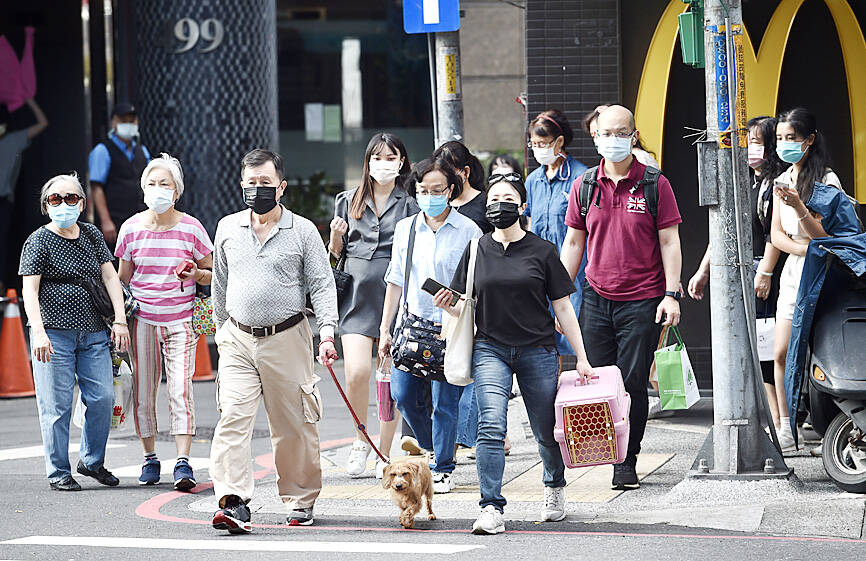The mask mandate for outdoor settings is to lifted on Thursday, and the weekly cap on international inbound travelers is to be removed on Dec. 10, the Central Epidemic Command Center (CECC) said at its regular news conference yesterday.
The center also announced that starting from Friday, children aged five to 11 can receive a COVID-19 vaccine booster, and that rules for visiting hospital patients are to be partially eased from Dec. 10.
While wearing a mask will no longer be mandatory outdoors, Deputy Minister of Health and Welfare Victor Wang (王必勝) reminded the public that it would still be required for indoor spaces, including public transportation, but with two minor changes made.

Photo: Peter Lo, Taipei Times
People can remove their masks when singing or giving toasts while making rounds during a banquet, which were temporarily banned because of the COVID-19 outbreak, the CECC head said.
Asked whether masks would be required for outdoor New Year’s events, Wang said that the center would continue to monitor the local COVID-19 situation and announce special rules for certain events, if necessary.
Wearing a mask is recommended when people are in crowded places or for people with allergies, chronic illnesses, a fever or respiratory problems to prevent COVID-19 and other infectious diseases, he said, adding that Thursday would mark the 555th day since the mask mandate was implemented.
Starting from Dec. 10, the cap on international inbound travelers is to be removed, as the local outbreak has slowed and imported cases have dropped, which should give people time to make plans for the upcoming holidays, he said.
Centers for Disease Control (CDC) Deputy Director-General Chuang Jen-hsiang (莊人祥) said that starting on Friday, children aged six to 11 who have received the primary series (two doses) of the Moderna or Pfizer-BioNTech vaccines can get Moderna’s Omicron BA.4/BA.5-adapted bivalent COVID-19 vaccine as a booster dose.
Children aged five can receive the Pfizer-BioNTech vaccine for children as a booster dose, which must be at least 84 days after their last dose of the primary series, the CECC spokesman said.
The center is working with local education and health departments to arrange for vaccinations on school campuses for five to 11 year olds, he said.
CDC Deputy Director-General Philip Lo (羅一鈞), deputy head of the CECC’s medical response division, said that from Dec. 10, visits to all hospital departments would be allowed.
Visits are currently limited to certain departments, such as intensive care units and hospice wards.
However, they would only be able to visit once a day within a set period and only two visitors would be allowed each time.
Exceptions would be made if they are visiting a patient who is to undergo surgery, an invasive exam or treatment or needs a signed consent or to be accompanied, the CECC said.
Visitors will have to present a negative COVID-19 rapid test result, wear a mask and practice hand hygience, Lo said.
Visitors who have been diagnosed with COVID-19 within three months can be exempt from showing a negative test result, but they should make the visit at least 15 days from their last diagnosis, Lo said, adding that people who are practicing self-disease prevention should avoid visiting, unless they test negative and are granted permission by the hospital.

The CIA has a message for Chinese government officials worried about their place in Chinese President Xi Jinping’s (習近平) government: Come work with us. The agency released two Mandarin-language videos on social media on Thursday inviting disgruntled officials to contact the CIA. The recruitment videos posted on YouTube and X racked up more than 5 million views combined in their first day. The outreach comes as CIA Director John Ratcliffe has vowed to boost the agency’s use of intelligence from human sources and its focus on China, which has recently targeted US officials with its own espionage operations. The videos are “aimed at

STEADFAST FRIEND: The bills encourage increased Taiwan-US engagement and address China’s distortion of UN Resolution 2758 to isolate Taiwan internationally The Presidential Office yesterday thanked the US House of Representatives for unanimously passing two Taiwan-related bills highlighting its solid support for Taiwan’s democracy and global participation, and for deepening bilateral relations. One of the bills, the Taiwan Assurance Implementation Act, requires the US Department of State to periodically review its guidelines for engagement with Taiwan, and report to the US Congress on the guidelines and plans to lift self-imposed limitations on US-Taiwan engagement. The other bill is the Taiwan International Solidarity Act, which clarifies that UN Resolution 2758 does not address the issue of the representation of Taiwan or its people in

US Indo-Pacific Commander Admiral Samuel Paparo on Friday expressed concern over the rate at which China is diversifying its military exercises, the Financial Times (FT) reported on Saturday. “The rates of change on the depth and breadth of their exercises is the one non-linear effect that I’ve seen in the last year that wakes me up at night or keeps me up at night,” Paparo was quoted by FT as saying while attending the annual Sedona Forum at the McCain Institute in Arizona. Paparo also expressed concern over the speed with which China was expanding its military. While the US

SHIFT: Taiwan’s better-than-expected first-quarter GDP and signs of weakness in the US have driven global capital back to emerging markets, the central bank head said The central bank yesterday blamed market speculation for the steep rise in the local currency, and urged exporters and financial institutions to stay calm and stop panic sell-offs to avoid hurting their own profitability. The nation’s top monetary policymaker said that it would step in, if necessary, to maintain order and stability in the foreign exchange market. The remarks came as the NT dollar yesterday closed up NT$0.919 to NT$30.145 against the US dollar in Taipei trading, after rising as high as NT$29.59 in intraday trading. The local currency has surged 5.85 percent against the greenback over the past two sessions, central